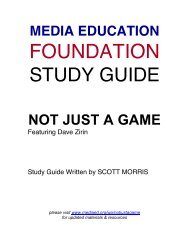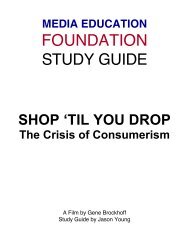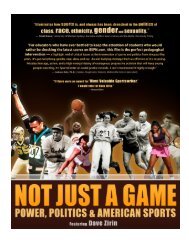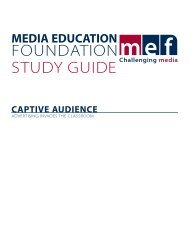Sext Up Kids [Transcript] - Media Education Foundation
Sext Up Kids [Transcript] - Media Education Foundation
Sext Up Kids [Transcript] - Media Education Foundation
Create successful ePaper yourself
Turn your PDF publications into a flip-book with our unique Google optimized e-Paper software.
INTRODUCTION<br />
SEXT UP KIDS<br />
[<strong>Transcript</strong>]<br />
Narrator: Little girls entranced by a world of make-‐believe. Playing princess, putting on<br />
makeup, wearing high heels, wanting to look older. But not this kind of older. Controversy<br />
rages over sexualization of little girls. From hit TV shows to high fashion spreads in Vogue<br />
to amateur dance sensations on YouTube, little girls are strutting their stuff before they<br />
even have any stuff.<br />
Susan Linn: Little girls are going from toddlers to teenagers with just about nothing in<br />
between.<br />
Narrator: The desire to look older younger is what's fueling the tween market – a market<br />
increasingly sexualized, making prepubescent girls look like porn-‐stars.<br />
Alexandra: We have to become bustier at an earlier age. We have to be very skinny at an<br />
earlier age.<br />
Narrator: And as ever-‐younger boys have 24/7 access to hard-‐core internet porn...<br />
Teen Boys: I want to say in grade four or grade five. / Six or seven, like I had a friend over<br />
at my house. / Ok, dudes on top of the girl, that's what sex is.<br />
Narrator: ...Some girls now feel pressure to deliver porn-‐star performance.<br />
Peggy Orenstein: Anal is becoming the new oral.<br />
Narrator: Smartphones and social media make it possible not only for kids to consume X-‐<br />
rated images but to produce them with devastating consequences.<br />
Dot: My heart just dropped. I was like, how many people have seen me like this?<br />
Narrator: Forcing kids to grow up in a hypersexualized world.<br />
Title Screen: <strong>Sext</strong> <strong>Up</strong> <strong>Kids</strong><br />
SEXUALIZED CHILDREN & MARKETING<br />
Narrator: These images are unsettling. For some, even titillating. Somehow, sexualized<br />
children have become part of our culture. Somehow, letting eleven year olds dress like this<br />
© 2012 <strong>Media</strong> <strong>Education</strong> <strong>Foundation</strong> | www.mediaed.org<br />
This transcript may be reproduced for educational, non-‐profit uses only.<br />
1
has become okay. Who would actually let their kid walk out the door like that? Well,<br />
millions of parents because this clothing sells. By degrees, preteen clothing moved from<br />
sassy to suggestive to outright sexy. It's called sexualization, and it has become the new<br />
normal – thanks in large part to a concept invented by the marketing industry.<br />
Text on screen: KAGOY<br />
Narrator: "KAGOY": <strong>Kids</strong> are getting older younger.<br />
Susan Linn: What the marketing industry decided to do is to say, "Well, if three year olds<br />
want to be thirteen year olds, let's market to them as if they were thirteen year olds. And if<br />
eight year olds want to be sixteen year olds, let's market to them as though they were<br />
teenagers."<br />
Narrator: That market is now worth an estimated 150 billion dollars a year in the U.S.<br />
alone. And it's dominated by junior versions of teens’ favorite stores. A survey of fifteen<br />
major American clothing store websites found about a third of girls’ apparel was<br />
considered sexualized – with everything from push-‐up bras and thongs to micro-‐mini skirts<br />
aimed at adolescent shoppers.<br />
Girl: Cinderella. The Princess and the Frog...<br />
Narrator: But the slide into sexualization may begin at a much earlier age, starting with<br />
something as innocuous as playing princess. And when it comes to playing princess, Disney<br />
has cornered the market. With over 26,000 items, 'princess' is now the hottest girls' brand<br />
on the planet. And every little girl knows their names by heart.<br />
Girls: Belle, Snow White, Jasmine, Arial, Rapunzel, Sleeping Beauty and Cinderella from<br />
Cinderella.<br />
Narrator: Just guess what they want to be when they grow up?<br />
Girl: A princess. / A princess too. / Be a princess too.<br />
Peggy Orenstein: It is cute. It's really adorable. Who doesn't like to see their little girl<br />
walking around? And there's this way that it's very precious, and it feels like something<br />
protective against sexualization, but I think there's a real compelling argument to be made<br />
that it's priming them for sexualization. When there's just one form of play that they do for<br />
three years, and it's all about being the prettiest of them all and the fairest of them all, that<br />
becomes problematic. It goes really quickly from being the prettiest little girl to needing to<br />
be the hottest little girl. And its emphasis is over and over on beauty, on externals, on your<br />
defining yourself through how you look to others. And that primes girls and pushes them<br />
towards the hypersexualization that happens at an older age.<br />
Girls: [Singing] "Happy Birthday Zoe!"<br />
© 2012 <strong>Media</strong> <strong>Education</strong> <strong>Foundation</strong> | www.mediaed.org<br />
This transcript may be reproduced for educational, non-‐profit uses only.<br />
2
Narrator: That older age is now about seven. That's when girls get bored with Princess<br />
Barbie and beg for dolls with attitude.<br />
Peggy Orenstein: So first we had the Bratz dolls that had the big, pouty lips that are highly<br />
glossy, and they had those heavy eyeshadows and they had tiny little skirts. And they<br />
looked really… Barbie seems quaint by comparison. These dolls look like little Sesame<br />
Street walkers.<br />
Narrator: And if Bratz dolls aren't racy enough, consider the dolls from “Monster High.”<br />
Susan Linn: They go beyond Barbie. They go beyond the Bratz dolls. They're more<br />
anorexic looking. They are more sexualized than even the dolls were before. And, you<br />
know, the Bratz dolls were really pretty bad to begin with.<br />
Narrator: Even under the watchful eye of parents, toy manufacturers and marketers have a<br />
captive audience. Federal law now allows advertisers to market directly to kids on<br />
television with very few restrictions. And those restrictions disappear on the Internet,<br />
where most six year olds navigate freely to their favorite toy sites.<br />
Susan Linn: Children can be targets for marketing any time of day or night, and marketers<br />
can bypass parents as they've never been able to before.<br />
Peggy Orenstein: It's going to be dolls, it's going to be books, it's going to be a movie, it's<br />
going to be a TV show, it's webisodes, it's clothing, it's accessories.<br />
Narrator: The American Psychological Association has been tracking the impact of this<br />
avalanche of sexualized toys and clothing on girls. According to the APA's landmark study,<br />
as girls hit the teen years, the damage mounts.<br />
Dr. Deborah Tolman: There were strong associations with negative health outcomes:<br />
mental health, depression, self-‐esteem. Sexualization was associated with more risk-‐<br />
taking, lack of condom use.<br />
Narrator: Marketers now even sell 'stupid' as sexy. For example, the “Be Stupid” campaign<br />
by Diesel jeans. Some of the campaign's most controversial billboard images have been<br />
banned in Britain.<br />
PUBERTY & SELF-‐ESTEEM<br />
Narrator: At the core of concern about sexualization, just as girls hit puberty, they start<br />
seeing themselves as objects of someone else's needs and desires.<br />
Dr. Deborah Tolman: We learn how to sexualize ourselves. It makes us very, very self-‐<br />
conscious all the time because we're thinking about what we look like all the time.<br />
© 2012 <strong>Media</strong> <strong>Education</strong> <strong>Foundation</strong> | www.mediaed.org<br />
This transcript may be reproduced for educational, non-‐profit uses only.<br />
3
iGirl Counselor: Sometimes my monster is actually a bunch of super-‐models who laugh at<br />
me and go, "Haha, we're so much better than you."<br />
Narrator: In British Columbia, the "iGirl" workshop tries to help girls fight sexualization.<br />
Saleema Noon: The goal of "iGirl" is to provide girls at your age...<br />
Narrator: Since beginning her workshops a decade ago, Saleema Noon has seen every<br />
younger girl succumb to the pressure of being seen to be sexy.<br />
Saleema Noon: Recently, I was at a school where two grade seven girls took some pictures<br />
of themselves topless at a sleepover on one of their cell phones and sent the pictures to one<br />
of the boys in their class who they were crushing on. And when they were asked why they<br />
sent the pictures, they said, "Because we wanted him to notice us." And I felt like crying.<br />
Narrator: Because she hears stories like these too often, Noon lowered the target age of<br />
her workshop.<br />
Saleema Noon: We targeted the ten to thirteen year old age group and very quickly we<br />
found that this was too late. Now we work with nine year olds. And it's so important<br />
because, at earlier and earlier ages, girls are pressured to be adult. They're not allowed to<br />
be kids for long anymore.<br />
iGirl Counselor: Sometimes girls say bad things about themselves. Sometimes they speak<br />
badly about themselves. What are some things that you hear?<br />
iGirl Participant: 'Oh, I'm not skinny enough!'<br />
Saleema Noon: So more and more, our girls are feeling pressure to be adults.<br />
Narrator: And that pressure only increases with technology. As devices designed for<br />
adults, like smartphones, are now being used by kids as young as nine.<br />
Saleema Noon: <strong>Kids</strong> are getting these adult tools in their hands, and they're not<br />
understanding, and maybe they're incapable of understanding because their brain is still<br />
under construction, the difference between public and private – with the Internet being as<br />
public as you can get and our bodies and sexuality being as private as you can get.<br />
Emily: Every time you look at your phone, there's someone sexting you. And you can tell<br />
them to stop, but there's no way you can make them stop, right? It's more difficult to<br />
handle it almost because you can't get away from it.<br />
Narrator: Sixteen-‐year-‐old Emily and her sister, thirteen-‐year-‐old Chloe, are trying to<br />
navigate their way through an X-‐rated culture. And that concerns their mom, Kim.<br />
© 2012 <strong>Media</strong> <strong>Education</strong> <strong>Foundation</strong> | www.mediaed.org<br />
This transcript may be reproduced for educational, non-‐profit uses only.<br />
4
Kim Benson: They're bombarded with it. It's in every fiber of their social life. Part of the<br />
problem is they're not even understanding what it is. They're not understanding that<br />
they're being carried along in this wave of being sexualized.<br />
Narrator: She should know. Back in the 80s, Kim could have been the poster girl for<br />
sexualization as a popular "Sunshine Girl" pinup in the Winnipeg Sun.<br />
Kim Benson: Here's a picture. Yeah, I totally did it for attention. You know, if you get put<br />
in a paper and a magazine and everybody's going to look at you, you're popular, you're<br />
famous – that kind of thing.<br />
Narrator: She's hoping her daughters don't follow in her footsteps. So every chance she<br />
gets, she points out sexualized content in pop culture.<br />
Kim Benson: Katy Perry in "California Gurls,” she's half naked, and she's humping cotton<br />
candy, shooting whipping cream from her cupcake breasts. And I always say to my girls,<br />
“You don't see Bono in a G-‐string humping cotton candy to sell his music.”<br />
ONE WAY TO BE FEMALE<br />
Dr. Gail Dines: This is the first time ever you would be in a room full of people and they<br />
would all know who a so-‐called porn-‐star is.<br />
Narrator: Author Gail Dines is also fighting back against sexualization. Here at Boston's<br />
Wheelock College, she shows her students how pop culture is fast becoming porn culture.<br />
Dr. Gail Dines: Squeaky-‐clean Hannah Montana Miley Cyrus is aging out of Disney. What's<br />
she going to do? She has to be visible in a society populated by Lady Gaga, Beyoncé,<br />
Rihanna, all of those. They came out with this. And this marked the beginning of the<br />
reshaping of Miley Cyrus.<br />
Narrator: This is the controversial tween angel Vanity Fair photo shoot that transformed<br />
Cyrus from Disney to diva. These photos of Cyrus, who was fifteen at the time, became the<br />
flash point in the debate over sexualization.<br />
Dr. Gail Dines: And of course, the image with her father. Would you like to sit like that<br />
with your father? The S&M gear and the hypersexualized look. Now when you look at<br />
Miley Cyrus, what you see is someone who fits in seamlessly with the hypersexed society.<br />
And remember, to be visible you have two choices in a hypersexualized society. You're<br />
either fuckable or invisible. If you're thirteen today and you are an adolescent needing to<br />
figure out what it means to be female, and you're going to sift through all that's on offer by<br />
the culture, you only have one way of being female. The kind of Britney Spears, Paris Hilton<br />
image, which is this hypersexualized view. You have to either buy into that image or you<br />
going to choose invisibility for yourself, and you know what? It is developmentally out of<br />
step with adolescence to choose invisibility.<br />
© 2012 <strong>Media</strong> <strong>Education</strong> <strong>Foundation</strong> | www.mediaed.org<br />
This transcript may be reproduced for educational, non-‐profit uses only.<br />
5
Paddy McCallum: You're in the band room dancing and then we cut to you dancing<br />
somewhere else, then we cut back...<br />
Narrator: In the media studies class at Chatelech High School in Sechelt, B.C., these girls are<br />
making their own music video, emulating their idol Miley Cyrus.<br />
Miley Cyrus: What's up guys, it's Miley. Just want to say hello to everyone...<br />
Narrator: Like millions of teens, Miley connects using a webcam, creating a kind of friend-‐<br />
like intimacy with her legions of fans. Their idol may look more like a porn-‐star than a pop<br />
star, but that doesn't seem to bother them.<br />
Paddy McCallum: They're not particularly shockable. Their tolerance for sexual imagery<br />
is very, very high. I suppose the question that arises in anyone's mind, whether you're a<br />
parent or a teacher or in the minds of some young people is, should there be a level of<br />
shockability?<br />
Chatelech High School Teen Girl: Miley just got twitter, so every day I have her tweets<br />
sent to my phone, which is over there, and she, like, said she wasn't feeling well today but<br />
all of her fans tweeted her and they were just like, "Get better Miley." You know, it's cool.<br />
Paddy McCallum: Now the challenge is more how to get kids to think critically about<br />
something that is very much part of their world. Very much bound up within their sense of<br />
community, and even within their sense of their bodies, their friendships, their<br />
relationships and their world. So there isn't that distance anymore between the media<br />
event and the viewer's experience of that event.<br />
Narrator: And so girls don't see anything wrong with coming to school dressed much like<br />
their idols.<br />
Paddy McCallum: It's no news to anybody working, and particularly in high schools, that<br />
the girls are often showing up – and you know the fashions change, things come and go –<br />
but the girls are often showing up dressed in a highly sexualized way.<br />
Gail Dines: Our young girls, their backs are against a wall. There is one way to be female in<br />
this culture and it is a way that sets them up for all sorts of potential abuse.<br />
ACTING SEXY FOR BOYS<br />
Chatelech High School Teen Girl Montage: My name's Alexandra / Chloe / Dot / Callista<br />
/ I'm thirteen / Twelve / Fifteen / Sixteen years old / and I've been called a slut / a bitch /<br />
ugly / ho / cunt / whore / a bitch / a bastard / and boys say bad things to me all the time. /<br />
They don't understand how hurtful the words are. / If you stay quiet about it too, you<br />
know, they'll just keep picking on you and bugging you. / You kind of get used to it after a<br />
© 2012 <strong>Media</strong> <strong>Education</strong> <strong>Foundation</strong> | www.mediaed.org<br />
This transcript may be reproduced for educational, non-‐profit uses only.<br />
6
while, which is the sad thing. / It makes me feel bad. It makes me feel pretty bad about<br />
myself.<br />
Narrator: As girls are bombarded with images that reinforce their value as sex objects,<br />
boys learn that's just how to treat them.<br />
Dot: They want you to be a skinny little waist, perfect body, nice hair.<br />
Alexandra: We have to become bustier at an earlier age, we have to have… Be very skinny<br />
at an earlier age, and look a specific way. And elementary going into high school? Because<br />
you gotta be perfect, you gotta be that girl that's gonna be standing out and like, "Oh I know<br />
her," and you have to be popular, when really you don't have to. You gotta be a kid.<br />
Narrator: With the pressure to look sexy younger comes the pressure to act sexy younger.<br />
Dr. Deborah Tolman: Showing yourself off as sexually empowered, as a performance,<br />
which is really what I think not all, but many, young women are doing. Many of them often<br />
drunk, certainly in the “Girls Gone Wild” videos, it really is a performance, and performance<br />
is not about your own body.<br />
Narrator: The message? When girl meets boy, it's all about the boy.<br />
Callista: Well, it says, "Decode his sex style." It's about her finding out how to please him<br />
other than him trying to please her. It's all about him apparently.<br />
Dr. Gail Dines: Cosmopolitan is probably bought by the tweens market. And really the big<br />
issue in Cosmopolitan is how to give him mind-‐blowing orgasms. If you read Cosmopolitan,<br />
you would never know a woman has an orgasm.<br />
Callista: In this picture, it's the guy on top of the girl. It says, "Getting on top might prove<br />
to be a tussle but a girl's gotta do." Like what? A ‘girl’s gotta do what a girl’s gotta do’?<br />
Narrator: In young teen, and even preteen circles, that often means oral sex.<br />
Dot: Boys expect you to be into that. They expect you to be like, "Well, I expect this of you."<br />
And what if you're not comfortable doing that? What if you've never done that before? You<br />
don't know how. You've never grown up with it because you're a teenager, you're a child.<br />
You shouldn't know all that. But if you're in a relationship, and someone's pressuring you<br />
to do something like that, if you like the guy, you'll probably do it just for him.<br />
Alexandra: And to make him happy.<br />
Narrator: No wonder twenty-‐year-‐old Vanessa Fraser is so busy these days. As a sex<br />
blogger, she became the go-‐to girl for thousands of teens with questions about sex.<br />
© 2012 <strong>Media</strong> <strong>Education</strong> <strong>Foundation</strong> | www.mediaed.org<br />
This transcript may be reproduced for educational, non-‐profit uses only.<br />
7
Ness Fraser: Girls – to give guys oral sex when they're thirteen and fourteen – there's<br />
really no pleasure in it for them other than being the girl that did that, and now this guy<br />
might like you or this guy might want to be your boyfriend.<br />
Narrator: The more girls perform for the boys, the less they think about themselves.<br />
Peggy Orenstein: I talked to one of the top researchers in girls and sexual desire and what<br />
she told me is that, increasingly, she's seeing that when she asks girls how an experience of<br />
arousal felt to them, they respond by telling her how they feel they looked. And she has to<br />
tell them that looking good is not a feeling.<br />
Narrator: But when looking good and acting sexy transform their idols into superstars,<br />
teen girls can't help but get the dominant message in mainstream pop culture, "Act sexy for<br />
boys." So what's that say to boys?<br />
Peggy Orenstein: Boys are completely steeped in this culture where girls' sexuality<br />
becomes a performance, and it distorts their view of what they're supposed to want and<br />
what they're supposed to look for in a girl.<br />
Narrator: What boys look for now in a girl is often porn-‐star performance. And there's<br />
growing evidence they are getting it.<br />
Dr. Ralph DiClemente: We find with teenage girls that twenty-‐two percent report anal sex<br />
within the past sixty days.<br />
TEEN BOYS & PORN<br />
Narrator: As the pressure to sexualize ever-‐younger girls intensifies, ever-‐younger boys<br />
also find themselves inundated with sexual imagery. In their favorite magazines, TV shows<br />
and hottest music videos. All offer up essentially what, a generation ago, was called "soft<br />
porn." But the game changer is hard-‐core. Not the kind that comes in a brown paper wrap.<br />
The kind that comes with the click of a mouse. The kind that teen boys can't get enough of.<br />
Teen Boys: Probably at least three to four times a week. / Two or three times a week. /<br />
Every time you got a hard-‐on.<br />
Dot: That's what they use their iPods for, they get the Wi-‐Fi. They just… It's everywhere.<br />
Narrator: When it comes to confronting the issue of teen boys and porn, most parents<br />
believe it's about somebody else's kid. But with an estimated seventy to eighty percent of<br />
teen boys watching online porn, turns out it’s pretty well everybody's kid.<br />
Dr. Lucia O'Sullivan: Porn, in many ways, is becoming the super-‐educator in terms of<br />
sexual information.<br />
© 2012 <strong>Media</strong> <strong>Education</strong> <strong>Foundation</strong> | www.mediaed.org<br />
This transcript may be reproduced for educational, non-‐profit uses only.<br />
8
Teen Boys: It was my first full-‐blown, fully naked chick. / Ok, the dudes on top of the girl,<br />
that's what sex is.<br />
Paddy McCallum: If there's an elephant in the room right now that we're not talking about<br />
in schools, it's pornography. The amount of pornography that the boys are able to access;<br />
the young age at which they're accessing it.<br />
Teen Boys: I wanna say grade four or five. / Six or seven, like I had a friend over at my<br />
house. / You type in "naked chicks" or "titties." It’s that easy.<br />
Narrator: The Internet makes porn affordable, accessible and anonymous. And just so<br />
easy for boys to find their favorite sites.<br />
Teen Boys: "xandxx.com" / "pornhub.com" / "youporn.com" / "youjizz.com"<br />
Narrator: No one really knows the effect hard-‐core porn has on kids, but there's an urgent<br />
need to find out. The key question...<br />
Dr. Ralph DiClemente: Whether there is in fact a relationship between exposure to<br />
sexually explicit material and young people's behavior. We speculate there is, in fact,<br />
particularly for much younger folks. Fourteen, fifteen, thirteen.<br />
Narrator: Six hundred American families with teenage boys, thirteen to seventeen, have<br />
allowed Dr. DiClemente to capture all the data off their home computers. The study will<br />
examine which websites they visit for how long and how often. Then he'll do follow-‐up<br />
interviews, tracking the teen boys' attitudes towards sex. The average thirteen year old has<br />
access to the kind of hard-‐core porn that, just a decade ago, was out of reach for most<br />
adults. It is full of offensive language. The sex depicted is often brutal, featuring acts like<br />
aggressive oral sex.<br />
Dr. Gail Dines: And what they do often is they put a lot of mascara on her eyes so that her<br />
eyes are running, so you actually get evidence to see that she's gagging.<br />
Narrator: And everywhere, anal sex. Experts fear the enormity of content and ease of<br />
access leaves young boys with a distorted idea of what sex is all about.<br />
Dr. Ralph DiClemente: Here we are talking about sex and violence, and that's a very<br />
combustible combination for increasing the risk for young people.<br />
Narrator: Girls know all too well what boys are watching.<br />
Dot: People don't really talk about it because they're like, "Oh that's wrong.” But I know<br />
lots of people who do that secretly and then it influence the way they act, the way they treat<br />
girls, and the way they look at girls.<br />
© 2012 <strong>Media</strong> <strong>Education</strong> <strong>Foundation</strong> | www.mediaed.org<br />
This transcript may be reproduced for educational, non-‐profit uses only.<br />
9
Alexandra: It also changes them, their personality. It makes them usually a lot crueler<br />
because, when they look at this, they think, "I could get that."<br />
Narrator: And there's growing evidence they are getting it. For instance, anal sex.<br />
Peggy Orenstein: Anal is becoming the new oral so that the new way that girls prove that<br />
they're really sexually free and sexually entitled is by having anal sex.<br />
Dr. Ralph DiClemente: In my own research here in Atlanta, we find with teenage girls that<br />
twenty-‐two percent report anal sex within the past sixty days. That's not in a year, that's in<br />
the past two months.<br />
Ness Fraser: Young males and young females who watch porn are seeing that and are<br />
seeing the porn-‐stars are enjoying themselves, so obviously I would be enjoying myself as<br />
well.<br />
Narrator: But how much does porn influence what goes on beyond the high school<br />
hallway? Dr. Lucia O'Sullivan's team is tracking a large sample of adolescents and early<br />
reports suggest young girls and women are having sex when they are not ready and getting<br />
hurt as a result.<br />
Dr. Lucia O'Sullivan: They were having sexual intercourse without being sufficiently<br />
aroused. In fact, not aroused at all. And had little understanding that they needed to have<br />
lubrication for intercourse to be comfortable – penal-‐vaginal intercourse. Are young people<br />
really understanding what constitutes healthy, positive and comfortable sex?<br />
Narrator: And since pretty well every porn-‐star shaves or gets a bikini wax, so now do<br />
most teenage girls. Just ask Gail Dines' students.<br />
Dr. Gail Dines: They say, “You know here I was, twelve or thirteen – I didn't know what<br />
pornography was – and yet I was completely waxing and shaving. And I realize now that, at<br />
twelve or thirteen, pornography has shaped the way I thought about my body without even<br />
knowing what pornography was.”<br />
Narrator: Then there's Jenna Rose, the newest YouTube teen sensation. Only she's not<br />
even a teen. She's twelve. Her provocative performance in her online hit "O.M.G" caught the<br />
attention of Laci Green, whose YouTube channel about sex gets millions of hits.<br />
Laci Green on YouTube: Chalk full of pseudo strip dances, hip swinging and some<br />
Victoria's angel-‐esque lingerie, "O.M.G" is a visual landscape of lusty twelve year olds. I feel<br />
creepy that those words are even coming out of my mouth.<br />
Laci Green: It was a new low because I haven't really seen, up until this point, lingerie on<br />
children. It's not even just revealing clothing. It is clothing that has been culturally<br />
assigned for sexual situations, which is a pretty explicit message.<br />
© 2012 <strong>Media</strong> <strong>Education</strong> <strong>Foundation</strong> | www.mediaed.org<br />
This transcript may be reproduced for educational, non-‐profit uses only.<br />
10
Narrator: And the launch of a French lingerie line designed for girls age four to twelve has<br />
sparked more outrage.<br />
Laci Green: This creates a bridge to child pornography or, sort of, puts a damper on the<br />
exploitation factor of child pornography as if it's not really as bad as we've been thinking it<br />
is. So now we're just going to get one step closer. Get a little bit closer to, at this point,<br />
making children out to be like adults and to be sexualized in a way that adults have been<br />
sexualized.<br />
Narrator: While pop culture presents little girls as little women, porn goes to great lengths<br />
to portray young women as prepubescent.<br />
Dr. Lucia O'Sullivan: There seems to be a greater emphasis, more than ever in<br />
pornography, on the ‘barely legal’ or teens. Even to the point with the hairlessness, and the<br />
girls with pigtails and everything they do to make them look as young as possible.<br />
Narrator: Coming up, it's not only pornographers who sexualize young people. Thanks to<br />
smart phones, kids can do it themselves.<br />
Dot: The boy I was sexting was in grade eight. He thought it would be funny if he'd send it<br />
to ten of his friends.<br />
Narrator: Social media makes it possible not only to consume sexualized images 24/7 but<br />
to produce them with often disastrous consequences for kids.<br />
Dot: My heart just dropped. I was, like, how many people have seen me like this?<br />
SOCIAL MEDIA<br />
Narrator: Probably the last thing you'll ever see a teenager do on a phone is actually talk<br />
on it. While teenage boys now send about 2,500 texts per month, girls send more than<br />
4,000. That's an average of 135 texts a day. And then there are those who send a few more.<br />
Teen Girl: My mom checked my last phone bill. I had 17,000 texts received and sent in a<br />
month.<br />
Narrator: Most teen girls either text about boys or to boys. Call it today's version of pillow<br />
talk.<br />
Teen Girl: We, like, literally text each other every second since he added me on Facebook.<br />
Narrator: Since Facebook is the place where so many teen relationships begin, social<br />
media has made being sexy online as important as it is in person.<br />
© 2012 <strong>Media</strong> <strong>Education</strong> <strong>Foundation</strong> | www.mediaed.org<br />
This transcript may be reproduced for educational, non-‐profit uses only.<br />
11
Dr. Susannah Stern: They are oftentimes now repackaging their representations of<br />
themselves to fit the mass-‐mediated model of beauty, popularity, of sexuality.<br />
Narrator: But all that time in the virtual world can make girls feel closer to boys they<br />
barely know in real life.<br />
Dr. Lucia O'Sullivan: Computer-‐mediated communication tends to accelerate intimacy in a<br />
lot of ways. You're not immediately in front of someone so you're somewhat less self-‐<br />
conscious. So people report feeling very close to someone that they don't know very well,<br />
very quickly.<br />
Narrator: According to Dr. Lucia O'Sullivan, girls who text the most are also the most likely<br />
to experiment sexually.<br />
Dr. Lucia O'Sullivan: ‘Hypertexters,’ those who are people really in the top one-‐quarter of<br />
texting frequency, had a four times greater chance of a number of different sexual<br />
experiences a year later than did their same age peers.<br />
Narrator: O'Sullivan's research also suggests texting primes the pump for sexting. In her<br />
survey, almost thirty percent of teens admit to sending a naked or near naked picture of<br />
themselves to a crush. But what happens when that picture goes viral? In middle school,<br />
three of these four girls sent nude or seminude photos of themselves to boys.<br />
Dot: I was in grade seven. He thought it would be funny if he'd send it to ten of his friends.<br />
And then when I got to high school, it came up when I was in grade eight and someone<br />
actually showed me the picture. And that was horrible. My heart just dropped. I was like,<br />
how many people have seen me like this? I regret so much of that night. That year was<br />
hard, and I had a lot of people calling me names like that, and they had proof on their<br />
cellphones of what I did. And I can't take that back ever.<br />
Dr. Susannah Stern: We also have to understand that a young person doing this isn't a bad<br />
kid. Isn't doing something bad in their minds but is doing something that feels very<br />
comfortable, probably safer, than having some kind of real sexual encounter.<br />
Alexandra: I met this one guy and we started talking and then he asked me, "Can I have a<br />
picture?" And I said “yes.” And I wasn't fully naked. I was in a bra. But that picture went<br />
not only through a lot of my friends but a lot of my family. And a lot of those people also<br />
passed on that picture and also still hold it against me.<br />
Dr. Susannah Stern: Adults do so much hand wringing because they look at individual<br />
girls, and oftentimes their parents, and say, "How could you do such a thing? Why would<br />
you do such a thing?" And it's not shocking to me at all. I mean if you look across our<br />
culture, everything is saying, "Promote yourself, flaunt yourself, exhibit yourself." If young<br />
people weren't picking up on that message, they're missing the dominant mainstream<br />
message to young people today.<br />
© 2012 <strong>Media</strong> <strong>Education</strong> <strong>Foundation</strong> | www.mediaed.org<br />
This transcript may be reproduced for educational, non-‐profit uses only.<br />
12
Teen Girl: It was embarrassing. It’s embarrassing when that's your body with no clothes<br />
on in front of everyone and everyone sees you. And everyone sees you like that until that's<br />
gone, and it never really is, so... And it hurts.<br />
Jesse Miller: How many of you on Facebook have over a hundred friends? Over three<br />
hundred? Over four?<br />
Narrator: It's a story that is all too familiar to social media expert Jesse Miller. He teaches<br />
grade seven and eight students across British Columbia about the downside of being sexy<br />
on social media. And even he is shocked by what kids are willing to show and tell online.<br />
Jesse Miller: More and more I'm seeing content where kids are saying, "You know, this is<br />
me. And this is me in this private environment."<br />
Narrator: Unsettling to most parents, to most kids 'private' is increasingly public. Partly<br />
because private often means any place their parents aren't. Often that's online.<br />
Dr. Lucia O'Sullivan: We think that they equate being private about something with being<br />
ashamed about something. They're not ashamed of their sexual lives. That's actually a very<br />
refreshing trend in this sexual world in many regards. But a consequence of that is there's<br />
almost no privacy in their sexual lives.<br />
Narrator: By explaining life before the Internet, Jesse Miller tries to make kids understand<br />
just because technology makes it easy to do something doesn't make it smart.<br />
Jesse Miller: If I want to take a photo of myself, the first thing I had to do was buy a roll of<br />
film. I take 24 pictures of myself in front of my bathroom mirror. Then I take that film and<br />
I go to the store. They give me 24 photos that are printed on paper and I turn to him and<br />
say, "You know what? I would like to give you one of those photos. Feel free to write<br />
comments on the back. Feel free to 'like' this.” But if every photo you took on your digital<br />
camera, mom and dad got an instant copy of on their phone, would you take as many<br />
pictures? Would you take photos the same way?<br />
Narrator: And if that doesn't make kids sit up and take notice, this usually does…<br />
Jesse Miller: If you were anybody and you have a photo or a video of a child underneath<br />
the age of eighteen wearing less than a bathing suit on one of your laptops, iPhones, iPods,<br />
whatever it is – you are in possession of child pornography and that is a crime.<br />
News Clip: Six teenagers at Greensburg-‐Salem High School now face charges of child<br />
pornography.<br />
Parry Aftab on Early Exclusive: <strong>Kids</strong> who are sending naked pictures of themselves<br />
voluntarily to each other are now being charged as registered sex offenders.<br />
© 2012 <strong>Media</strong> <strong>Education</strong> <strong>Foundation</strong> | www.mediaed.org<br />
This transcript may be reproduced for educational, non-‐profit uses only.<br />
13
Narrator: These days the sexploits of kids are fodder for the nightly news across North<br />
America. In B.C., a number of teens face child pornography charges after posting pictures<br />
to Facebook of a sixteen year old girl allegedly being gang-‐raped at a rave.<br />
Teen Boy: I don't think she was as messed up as she's making it out to be.<br />
Teen Boy: She's trying to turn it to make it sound like she's a victim of something, rather<br />
than to say that she did something and that she knows it was incredibly idiotic.<br />
Narrator: Even after the pictures were removed and police told kids to stop blaming the<br />
victim, the attacks and the name-‐calling continued on social media. So lawmakers are<br />
exploring new criminal charges to control what’s known as "aggravated sexting": when<br />
naked pictures are circulated as a form of bullying or harassment.<br />
Dot: I know that a lot of those kids have past pictures of me, and I've confronted them<br />
about that. And for my knowledge most of them, and probably all of them, are deleted. It<br />
just makes me, when I think about it, makes me feel a lot safer and a lot stronger inside.<br />
Narrator: In spite of living in a hypersexualized world, girls still hold out hope for a<br />
happily ever after ending.<br />
Paddy McCallum: They want the romance. They want to be loved.<br />
HAPPILY EVER AFTER?<br />
Narrator: In less than a week, school is out for the summer so the kids at Chatelech High<br />
School in Sechelt reluctantly drag themselves to class.<br />
Paddy McCallum: [reading] "Had we but world and enough in time / This coineth lady<br />
were no crime / Rather at once..."<br />
Narrator: Paddy McCallum is hoping seventeenth century romantic poets will capture the<br />
attention of his distracted students.<br />
Paddy McCallum: [reading] "We would sit down and think which way to walk and past our<br />
long loved day..."<br />
Narrator: The language may be different, but to the girls the message is the same.<br />
Chatelech High School Girl: It's just a really pretty, spiffy, poetic version of what guys are<br />
all still saying today.<br />
Paddy McCallum: And what is that?<br />
Chatelech High School Girl: "Give us the sex!"<br />
© 2012 <strong>Media</strong> <strong>Education</strong> <strong>Foundation</strong> | www.mediaed.org<br />
This transcript may be reproduced for educational, non-‐profit uses only.<br />
14
Chatelech High School Girl: Girls are just growing up so quickly and boys are and<br />
everyone's looking at porn now because it's so available to everyone, and the romance is...<br />
There's no romance there.<br />
Paddy McCallum: The girls are really feeling that, and they're holding out this hope that, in<br />
spite of all the porn, and in spite of all the requests that are being made on them,<br />
somewhere in there, there is still the possibility of romance. There is still the possibility of<br />
mystery and love and passion.<br />
Narrator: But passion and romance aren't just for girls. Sex researcher Lucia O'Sullivan<br />
has studied the yearnings of both genders and the results may surprise you.<br />
Dr. Lucia O'Sullivan: What we found, actually, is that both young men and women have a<br />
much stronger, more positive association toward romance than sex. Men in fact didn't<br />
show this bias towards sex.<br />
Narrator: But even if they crave romance, porn may rob them of their ability to enjoy it.<br />
Dr. Ralph DiClemente: They've gotten some phone calls, one from a young man whose<br />
now in his twenties, who told me that he used to spend a lot of time watching online<br />
pornography. And he says now he can't have a real relationship. "I just can't. I just don't<br />
get excited." So he's actually taking this fictional relationship that he's seen on the net and<br />
he's elevated those in his mind as, 'these are normal relationships, healthy relationships.'<br />
Narrator: To bloggers like Vanessa Fraser, the solution is clear. Real romance and intimacy<br />
will return when both boys and girls can embrace a healthy sexuality.<br />
Ness Fraser: We need to teach girls that it's, first of all, that's it's okay to want to have sex.<br />
That it's totally okay to be enthusiastic. Making that firm decision doesn't make you a slut.<br />
It doesn't make you promiscuous. It makes you a woman who's taking charge of her own<br />
sexuality.<br />
Laci Green on YouTube: Guilt is a type of shame. It's shame about yourself, your partner,<br />
about your relationship, about your experiences.<br />
Laci Green: When I was twelve, I would have liked to have had a strong communication<br />
system about sexuality and relationships with my parents. And I wished that it wasn't so<br />
taboo and stigmatized. I wish that I wasn't made to feel so ashamed of it and guilty about it.<br />
Ness Fraser: Very few teenagers are lucky enough to live in a household where there is an<br />
open dialogue about sex.<br />
Kim Benson: Do you feel pressured?<br />
Chloe: Sometimes.<br />
© 2012 <strong>Media</strong> <strong>Education</strong> <strong>Foundation</strong> | www.mediaed.org<br />
This transcript may be reproduced for educational, non-‐profit uses only.<br />
15
Kim Benson: To do certain things?<br />
Emily: There will always be those kinds of pressures and everyone makes mistakes. Even<br />
though they know against their better judgment they make mistakes, and I think that's just<br />
part of being a teenager.<br />
Narrator: Back at the Benson home in Squamish, Kim strives to keep the open dialogue<br />
going. The former pin-‐up sets the stage for tough talks.<br />
Kim Benson: As a parent you can think of it as a privilege that you're child has come to you<br />
with these questions. You're privileged to have the opportunity to teach your child. So, no<br />
judgment.<br />
Narrator: And because her kids don't feel judged, they're able to admit when they've made<br />
mistakes.<br />
Emily: Yeah, I feel safe to fuck up. And I have fucked up. And I've told her. And it's all good.<br />
Narrator: Paddy McCallum's grade twelves have also made their share of mistakes. Their<br />
final media studies assignment is a message to younger students to resist the pressure to<br />
sexualize themselves. To hold on to what matters most – a childhood.<br />
Class Montage: To my twelve year old self. . . / Hitting puberty is not a race! / Confidence<br />
is sexy. / Don't diet, you're just a kid! / Real boobs feel way better than fake ones. / Stay a<br />
kid for as long as you can. / Stand up for what you believe in, stand up for yourself. / Take<br />
back your beauty. / Be different to be you. / Prince Charming does really exist; just he<br />
doesn't quite look like what you think. Keep your eyes open.<br />
[END]<br />
© 2012 <strong>Media</strong> <strong>Education</strong> <strong>Foundation</strong> | www.mediaed.org<br />
This transcript may be reproduced for educational, non-‐profit uses only.<br />
16


![Sext Up Kids [Transcript] - Media Education Foundation](https://img.yumpu.com/3099056/1/500x640/sext-up-kids-transcript-media-education-foundation.jpg)











